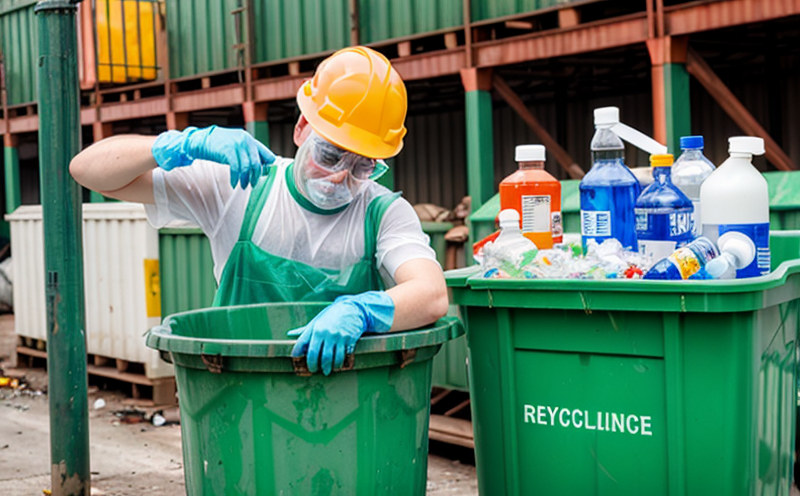BS EN ISO 11885 Chemical Testing of Wastewater by ICP OES
The British Standard (BS) and European Norm (EN) ISO 11885 is a comprehensive protocol for the analysis of trace elements in wastewater using Inductively Coupled Plasma Optical Emission Spectroscopy (ICP-OES). This method provides precise, accurate, and reliable results for a wide range of metals and metalloids typically found in industrial, municipal, or agricultural waste streams. The test is crucial for ensuring compliance with stringent environmental regulations while also supporting the development of sustainable waste management practices.
The process begins with the collection of representative samples from various points along the wastewater treatment process. Proper sampling techniques are essential to ensure that the sample accurately reflects the overall composition of the wastewater stream. Once collected, these samples undergo rigorous preparation steps which may include digestion using strong acids like nitric acid or perchloric acid, depending on the nature of the waste material.
The prepared samples are then introduced into the ICP-OES instrument, where they vaporize and ionize in a high-frequency radio wave field. The resulting ions emit light at specific wavelengths corresponding to their atomic spectra, which is detected by the optical system within the instrument. This emission spectrum allows for quantification of individual elements present in the sample.
The precision and accuracy of this method are enhanced by its ability to detect even trace amounts of metals down to parts per billion (ppb) levels. This sensitivity makes it particularly useful for monitoring compliance with stringent environmental regulations such as those outlined in European Union directives like Directive 2008/1/EC on waste management.
The results from this testing are critical not only for regulatory adherence but also for optimizing wastewater treatment processes. By identifying the specific elements present and their concentrations, operators can fine-tune their treatments to minimize environmental impact and reduce the load of harmful substances entering natural water bodies. Furthermore, understanding these trace element profiles helps in designing more effective recycling strategies, thereby contributing significantly towards sustainable resource management.
This testing methodology plays a vital role across various sectors including municipal waste services, industrial manufacturing processes involving heavy metals, mining operations generating tailings, and agricultural runoff control. Its application ensures that all stakeholders involved are aware of the quality and safety standards being maintained or exceeded during waste processing stages.
In summary, compliance with BS EN ISO 11885 through ICP-OES testing provides robust data supporting informed decisions about waste management practices. It enables continuous improvement in environmental performance by providing actionable insights into wastewater composition, thereby fostering a more sustainable approach to resource handling and disposal.
Why Choose This Test
Selecting BS EN ISO 11885 chemical testing for your wastewater analysis offers numerous advantages over other methods. Firstly, the precision of ICP-OES allows for accurate quantification of trace elements down to parts per billion levels, ensuring compliance with strict environmental standards set by regulatory bodies worldwide.
Secondly, this method provides reliable results consistently across multiple samples, making it suitable for both routine monitoring and complex investigations into specific contamination events. The repeatability and reproducibility characteristics of ICP-OES ensure that findings are trustworthy and credible within legal frameworks.
Moreover, the versatility of the test allows it to be adapted to different types of wastewater streams from various sources like municipal sewage systems or industrial effluents. This adaptability ensures comprehensive coverage needed for diverse applications ranging from urban planning to corporate responsibility initiatives.
A third benefit lies in its ability to provide detailed elemental profiles which can guide improvements in waste management practices by highlighting areas requiring attention or enhancement. Such information is invaluable when developing strategies aimed at reducing ecological footprint and promoting circular economy principles.
Lastly, choosing BS EN ISO 11885 chemical testing ensures adherence to internationally recognized standards, enhancing credibility among stakeholders including regulatory authorities, customers, investors, and the general public. This recognition fosters trust in your organization’s commitment to sustainable practices and responsible resource utilization.
Quality and Reliability Assurance
The quality of our BS EN ISO 11885 chemical testing services is underpinned by stringent adherence to international standards such as ISO/IEC 17025, which governs the competence of testing and calibration laboratories. Our team consists of highly qualified professionals certified in relevant disciplines who employ advanced instrumentation calibrated according to manufacturer specifications.
We maintain comprehensive quality management systems that include regular internal audits and external reviews conducted by accredited bodies ensuring continuous improvement. These measures guarantee consistency and accuracy in all our analytical outputs, enabling stakeholders to rely on the information generated from these tests confidently.
Our commitment extends beyond technical proficiency; we also ensure robust traceability of results through meticulous documentation practices that align with industry best practices. By doing so, we provide assurance not only about the quality but also the reliability of our findings, which are essential for making informed decisions regarding waste management processes and compliance.
Environmental and Sustainability Contributions
The implementation of BS EN ISO 11885 chemical testing contributes significantly to environmental protection efforts by providing detailed insights into wastewater composition. This knowledge enables more effective treatment methods leading to reduced pollution levels in receiving waters, thus protecting aquatic ecosystems.
By identifying specific elements present at low concentrations, we assist clients in optimizing resource recovery systems promoting circular economy principles. For instance, understanding metal content helps maximize valuable materials from waste streams, reducing reliance on virgin resources and minimizing extraction impacts.
The data obtained through this testing supports the development of improved recycling techniques enhancing overall sustainability performance. Moreover, it aids in assessing risks associated with potential hazardous substances ensuring safer disposal practices aligned with best environmental management practices (BEMPs).
Furthermore, compliance with stringent standards like BS EN ISO 11885 enhances reputation and trustworthiness among clients, partners, investors, and regulators alike. Organizations adopting these rigorous testing protocols demonstrate their commitment to sustainable development goals contributing positively to society at large.





